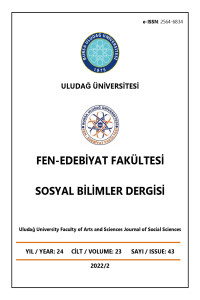Öz
Anahtar Kelimeler
kendinde varlık kendisi için varlık başkası için varlık fazladanlık bulantı
Kaynakça
- Bertholet, D. (2009). Sartre. (Çev: Z. İlkgelen), İthaki Yayınları.
- Bozkurt, N. (1984). Jean-Paul Sartre’ın insan anlayışı. Felsefe Arkivi, (25), 133-167.
- Cevizci, A. (1999). Felsefe sözlüğü. Paradigma Yayınları.
- Clayton, C. (2009). Nausea, melancholy and the internal negation of the past. Sartre Studies International, 15(2), 1-16.
- Contât, M. (2004). Sartre Sartre’ı anlatıyor - Filozofun 70 yaşındaki otoportresi. (Çev: T. Ilgaz), Yapı Kredi Yayınları.
- Direk, Z. (2010). Bir entelektüel olarak Jean Paul Sartre. Z. Direk, G. Çankaya Eksen (Ed.), Jean-Paul Sartre: Tarihin Sorumluluğunu Almak Kitabı içinde (15-39. ss.), Metis Yayınları.
- Foulquie, P. (1976). Varoluşçu felsefe. (Çev: Y. Şahan), Gelişim Yayınları.
- Gibbs, J. (2011). Reading and be-ing: Finding meaning in Jean-Paul Sartre’s La Nausée. Sartre Studies International, 17(1), 61-74.
- Gürsoy, K. (1987). Sartre ateizminin doğurduğu problemler. Kültür ve Turizm Bakanlığı Yayınları.
- Güvenç, E. (2013). J. P. Sartre felsefesinde bulantı kavramı. (Yayımlanmamış yüksek lisans tezi). Bursa: Uludağ Üniversitesi Sosyal Bilimler Enstitüsü.
- Hamner, E. L. (2003). Relieving Jean-Paul Sartre’s “Nausea”: Semiotics, suicide, and the search for God in Walker Percy’s “The Second Coming”. Christianity and Literature, 52(2), 181-202.
- Kerr, C. M. (2010). Stomaching the truth: Getting to the roots of Nausea in the work of Jean Paul Sartre and Flannery O’Connor. Christianity and Literature, 60(1), 67-96.
- Moeller, C. (1969). J. P. Sartre ve tabiat üstünün bilinmemesi. (Çev: M. Toprak), Remzi Kitabevi.
- Mounier, E. (1986). Varoluş felsefelerine giriş. (Çev: S. R. Kırkoğlu), Alan Yayıncılık.
- Murdoch, I. (1981). Sartre’ın yazarlığı ve felsefesi. (Çev: S. Hilav), Ağaoğlu Yayınları.
- Robbe-Grillet, A. (1982). Bulantının mirasçıları bizleriz. S. Hilav (Ed.), Yazko Felsefe Yazıları 2. Kitap içinde (143-145.ss.), Ağaoğlu Yayınları.
- Sartre, J. P. (1963). İş işten geçti. (Çev: Z. Bensan), Varlık Yayınları.
- Sartre, J. P. (1989). Sözcükler. (Çev: B. Onaran), Payel Yayınları.
- Sartre, J. P. (1994). Yaşanmayan zaman. (Çev: G. Devrim), Can Yayınları.
- Sartre, J. P. (1999). Akıl çağı. (Çev: G. Devrim), Can Yayınları.
- Sartre, J. P. (2010). Varlık ve hiçlik. (Çev: G. Çankaya Eksen, T. Ilgaz), İthaki Yayınları.
- Sartre, J. P. (2010). Varoluşçuluk. (Çev: A. Bezirci), Say Yayınları.
- Sartre, J. P. (2016). Bulantı. (Çev: M. Celal), Can Yayınları.
- Strathern, P. (1998). 90 Dakikada Sartre. (Çev: N. Uçansoy), Gendaş Yayınları.
- Timuçin, A. (2004). Felsefe sözlüğü. Bulut Yayınları.
Öz
Anahtar Kelimeler
being in itself being for itself being for others redundancy nausea
Kaynakça
- Bertholet, D. (2009). Sartre. (Çev: Z. İlkgelen), İthaki Yayınları.
- Bozkurt, N. (1984). Jean-Paul Sartre’ın insan anlayışı. Felsefe Arkivi, (25), 133-167.
- Cevizci, A. (1999). Felsefe sözlüğü. Paradigma Yayınları.
- Clayton, C. (2009). Nausea, melancholy and the internal negation of the past. Sartre Studies International, 15(2), 1-16.
- Contât, M. (2004). Sartre Sartre’ı anlatıyor - Filozofun 70 yaşındaki otoportresi. (Çev: T. Ilgaz), Yapı Kredi Yayınları.
- Direk, Z. (2010). Bir entelektüel olarak Jean Paul Sartre. Z. Direk, G. Çankaya Eksen (Ed.), Jean-Paul Sartre: Tarihin Sorumluluğunu Almak Kitabı içinde (15-39. ss.), Metis Yayınları.
- Foulquie, P. (1976). Varoluşçu felsefe. (Çev: Y. Şahan), Gelişim Yayınları.
- Gibbs, J. (2011). Reading and be-ing: Finding meaning in Jean-Paul Sartre’s La Nausée. Sartre Studies International, 17(1), 61-74.
- Gürsoy, K. (1987). Sartre ateizminin doğurduğu problemler. Kültür ve Turizm Bakanlığı Yayınları.
- Güvenç, E. (2013). J. P. Sartre felsefesinde bulantı kavramı. (Yayımlanmamış yüksek lisans tezi). Bursa: Uludağ Üniversitesi Sosyal Bilimler Enstitüsü.
- Hamner, E. L. (2003). Relieving Jean-Paul Sartre’s “Nausea”: Semiotics, suicide, and the search for God in Walker Percy’s “The Second Coming”. Christianity and Literature, 52(2), 181-202.
- Kerr, C. M. (2010). Stomaching the truth: Getting to the roots of Nausea in the work of Jean Paul Sartre and Flannery O’Connor. Christianity and Literature, 60(1), 67-96.
- Moeller, C. (1969). J. P. Sartre ve tabiat üstünün bilinmemesi. (Çev: M. Toprak), Remzi Kitabevi.
- Mounier, E. (1986). Varoluş felsefelerine giriş. (Çev: S. R. Kırkoğlu), Alan Yayıncılık.
- Murdoch, I. (1981). Sartre’ın yazarlığı ve felsefesi. (Çev: S. Hilav), Ağaoğlu Yayınları.
- Robbe-Grillet, A. (1982). Bulantının mirasçıları bizleriz. S. Hilav (Ed.), Yazko Felsefe Yazıları 2. Kitap içinde (143-145.ss.), Ağaoğlu Yayınları.
- Sartre, J. P. (1963). İş işten geçti. (Çev: Z. Bensan), Varlık Yayınları.
- Sartre, J. P. (1989). Sözcükler. (Çev: B. Onaran), Payel Yayınları.
- Sartre, J. P. (1994). Yaşanmayan zaman. (Çev: G. Devrim), Can Yayınları.
- Sartre, J. P. (1999). Akıl çağı. (Çev: G. Devrim), Can Yayınları.
- Sartre, J. P. (2010). Varlık ve hiçlik. (Çev: G. Çankaya Eksen, T. Ilgaz), İthaki Yayınları.
- Sartre, J. P. (2010). Varoluşçuluk. (Çev: A. Bezirci), Say Yayınları.
- Sartre, J. P. (2016). Bulantı. (Çev: M. Celal), Can Yayınları.
- Strathern, P. (1998). 90 Dakikada Sartre. (Çev: N. Uçansoy), Gendaş Yayınları.
- Timuçin, A. (2004). Felsefe sözlüğü. Bulut Yayınları.
Ayrıntılar
| Birincil Dil | Türkçe |
|---|---|
| Konular | Felsefe |
| Bölüm | Makaleler |
| Yazarlar | |
| Yayımlanma Tarihi | 31 Temmuz 2022 |
| Yayımlandığı Sayı | Yıl 2022 Cilt: 23 Sayı: 43 |
Cited By

This work is licensed under a Creative Commons Attribution 4.0 International License.


